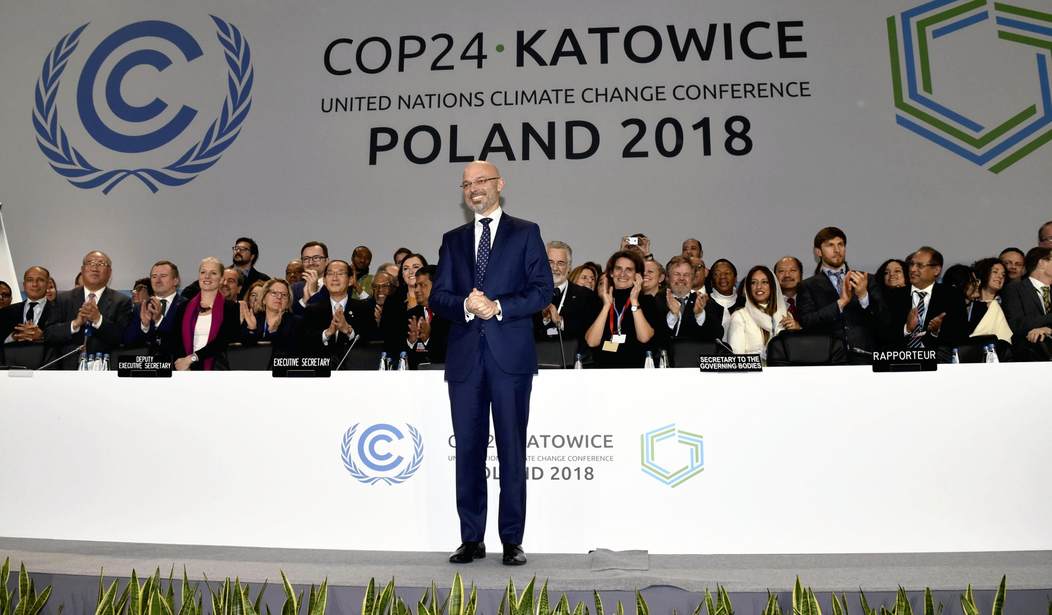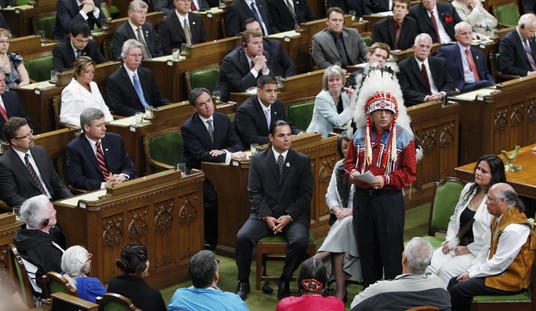Among the myriad dumb ideas put forth by climate change activists, arguably the dumbest is the Climate Damages Tax (CDT) promoted last week at the United Nations climate conference in Poland. No matter what one believes about the causes of climate change, the CDT would have no impact on climate and would simply damage domestic fossil fuel companies.
According to the Climate Damages Tax report launched during the UN climate conference by the World Wildlife Fund (WWF), Practical Action, and others in the “social justice” arena, the CDT would be a new charge imposed on coal, oil, and natural gas producers to account for the damage their products supposedly cause to the climate and to the world’s most vulnerable populations.
The report argues:
Already, at only 1°C of global warming, climate change fuelled events include extreme heat waves, rampant forest fires, devastating droughts, catastrophic floods, increasingly destructive hurricanes, typhoons and cyclones and sea level rise stealing people’s homes.
According to these activists, these events are primarily induced by rising greenhouse gas (GHG) levels, supposedly as a result of fossil fuel combustion. The activists want coal, oil and natural gas companies to pay up — big time: Under the proposed CDT plan they would eventually be taxed $300 billion a year for the “loss and damage” their products are ostensibly causing. (Excluding water vapor, 81% of U.S. GHG emissions in 2016 were carbon dioxide — CO2. The situation is similar in other countries).
The CDT plan fails in all respects. Recent climate change is not unusual and extreme weather events are not on the rise. GHG emissions are not a significant cause of climate change or extreme weather — yet even if they were, the CDT would do nothing to reduce emissions.
Here is why.
Under a CDT system, fossil fuel companies would be charged an amount for the extraction of each ton of coal, barrel of oil, or cubic liter of gas based on the quantity of GHG emissions that would eventually be released into the atmosphere when the fuel is burned. WWF and their partners propose that this CDT program be managed by the existing UN Green Climate Fund, a program that is failing miserably. (As a consequence of this failure, its chairman quit at its last meeting).
The CDT would begin at $5 per ton of CO2 equivalent in 2021 (CO2 equivalent describes different GHGs in a common unit, the amount of CO2 which would supposedly have the equivalent global warming impact of a particular amount of any GHG. The CDT would be increased by $5 per ton each year until 2030, when the rate would hit $50 per ton.
After that, the rate would be raised at the rate of $10 per ton every year — to reach $250 per ton by 2050.
This, say the report authors:
… will help incentivise the phasing out of fossil fuels by the middle of the century, and help keep CDT revenue for loss and damage at roughly $300 billion a year over this period.
The Climate Damages Tax report proposes that part of the revenue from the CDT would be allocated to pay for loss and damage from extreme weather that supposedly is largely the fault of fossil fuel companies. Some of the money would be returned to the country where the oil, coal, or gas was extracted to fund renewable energy projects and to promote jobs in that sector.
WWF and their partners would like to see the CDT introduced in 2019 at the Climate Change Summit in Chile when the Warsaw International Mechanism for Loss and Damage (WIM) is due to be reviewed. The WIM — a UN mechanism in which developed countries are deemed liable to developing countries for loss and damage associated with climate change impacts — is truly the Trojan Horse in the UN climate negotiations.
If ever enacted, the WIM could hold developed nations liable to poor nations for the impact of extreme weather events now, in the future, and to some undefined extent, in the past. Literally trillions of dollars are at stake.
Of course, fossil fuel companies already pay a great deal to the societies in which they operate. For example: Oil is now subject to government-imposed taxes and charges in the form of land bonus payments, land rental fees, royalties, corporate income taxes, sales taxes, excise taxes, and in several jurisdictions, carbon taxes on sales of final products like gasoline and diesel fuel. Adding a CDT “extraction tax” to all this would simply raise the price still further, eventually putting domestic producers out of business — refineries would shift to offshore oil supplies from producers which do not impose an extraction tax on their fossil fuel companies.
The hope that all countries would cooperate on a CDT is a pipe dream, says Robert Lyman, an Ottawa-based energy policy consultant and Principal at ENTRANS Policy Research Group, Inc.:
Ninety-eight countries now produce oil and gas and 25 produce significant quantities of coal. There is no way that all these countries will institute special new taxes on their domestic fossil fuel producers. Those that did would simply be imposing an added cost burden on their producers that would place them at a competitive disadvantage relative to the producers in other countries and, in extremis, drive them out of business, leaving the market to the remaining producers, with no net reduction in GHG emissions. (Emphasis added.)
The Climate Damages Tax report asserts:
Fossil fuels are the largest source of climate pollution [sic] in the world, responsible for 91% of global industrial greenhouse gases in 2015, and about 70% of all anthropogenic emissions. 100 fossil fuel companies and other entities are responsible for over half of all emissions since the start of the industrial revolution … It is high time the fossil fuel industry paid for the climate damage its products cause.
Assigning to the fossil fuel industry the full responsibility for a fuel cycle suggests that consumption is driven by production, whereas it is the other way around: Production is driven by the demand from consumers. And of course, most of the GHG emissions from any fossil fuel cycle arise when the fuel is actually consumed. For example, according to Lyman, 85% of the GHG emissions associated with the conventional oil fuel cycle occur when the fuel is burned:
Only 15 per cent arises from conventional oil exploration, development, production, transportation, refining and marketing — the parts of the life cycle for which oil companies can be considered responsible.
Why did WWF and their activist partners propose such a ridiculous plan in contrast to, say, simply increasing carbon taxes charged to the consumer? After all, that is where most of the GHG emissions originate.
Besides likely being intimidated by the violent “yellow jackets” protests against carbon taxes in France, CDT supporters apparently also see the proposal as a “social justice” issue. For example, Ralph Regenvanu, foreign affairs minister of the Pacific island state of Vanuatu, is a supporter of the CDT. Said Regenvanu in a statement at the Poland climate conference:
The injustice of climate change is that the impacts are felt first and hardest by those with the least responsibility for its causes.
There is, according to Regenvanu, “strong justification” to tax the fossil fuel industry to pay for the climate damage it is supposedly causing.
A real injustice against the poor will occur not due to trivial climate changes due to fossil fuel use, but if CDT supporters actually succeed in making fossil fuel use so expensive that a near-global phase-out occurs by 2050. This would deprive everyone but the rich from the miraculous benefits of abundant and effective fossil fuels. The CDT would leave the rest of the world dependent on costly, unreliable, and insufficient alternative energy sources such as wind and solar power.
The result would be a humanitarian catastrophe: The deindustrialization of developed countries, leading to millions of deaths due to exposure to the elements and starvation. Any opportunity for the poorest of the poor in developing countries to ascend out of poverty would be erased forever.
And, of course, all of this hinges on the false science promoted by the UN and climate campaigners such as Al Gore. The Climate Damages Tax is simply another plan for the transfer of wealth between the developed and the developing world — a last desperate effort to enforce global socialism.
It’s time for President Trump to pull the U.S. out of all UN climate change programs entirely, and to end the climate scare once and for all.









Join the conversation as a VIP Member